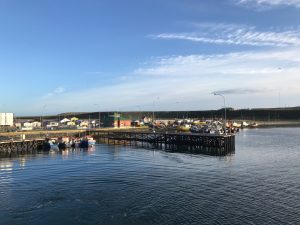Does marine spatial planning (MSP) deliver socio-ecological benefits?: Moving MSP evaluation forward
 Location: Global
Location: Global
Project duration: 2020-2022
Collaborators: Jonathan Kramer (SESYNC), Nicole Motzer (SESYNC), Natalie Ban (U Victoria), Wesley Flannery (Queen’s U Belfast), Anne Guerry (Stanford U), Benjamin Halpern (UC Santa Barbara), Rafael Magris (Chico Mendes Institute for Biodiversity Conservation), Shauna Mahajan (WWF), Ana Spalding (Oregon State U), Vanessa Stelzenmüller (Thünen Institute), Mary Turnipseed (Moore Foundation)
Goal: To develop a framework to evaluation marine spatial plans on social and ecological fronts; (2) to test the framework using case study marine spatial planning initiatives to better understand outcomes in practice
Description: There has been a sustained increase in the development and number of marine spatial plans over the past two decades. Managers and governments have embraced the approach as a way to maintain ecological integrity of marine environments while ensuring continued provisioning of economic, social and cultural benefits. However, there is limited empirical evidence that plans and associated management measures have effectively achieved stated goals. To address this important information gap, this project convented an interdisciplinary team of experts to move the theory and practice of marine spatial planning evaluation forward. First, we analyzed more than 40 existing marine spatial plans to examine whether the goals, objectives and reference points used in plans worldwide are consistent with the goals and objectives discussed in the academic literature. Next, recognizing the imperative of combining outcome and process evaluation, we developed a framework of social, cultural and political enabling conditions (critical factors related to planning and ongoing governance processes) to aid in the evaluation of MSP process. Finally, our group conducted a rapid assessment test of several marine spatial plans, using the enabling conditions framework as part of a broader theory-based outcome evaluation. We demonstrate the challenges and promise of theory-based MSP evaluation while providing a concrete methodology for linking outcome and process evaluation, identifying important enabling or disabling conditions and tying them to specific objective and outcomes, and better understanding how externalities (unexpected events that influence progress toward a goal) may be impacting the performance of MSPs. The evaluation method allows for data-driven assessment of plan objectives, identification of conditions under which progress toward goals has been made, and examination of site-specific context. And importantly, it accommodates a diversity of data types and disciplinary priorities. As governments and practitioners continue the development and implementation of marine spatial plans, and as opportunities for adaptive management arise, an understanding of outcomes is essential. Our team’s research represents new and concrete steps forward in the difficult task of evaluation, and provides information and tools for scientists and practitioners working to understand ocean planning outcomes.
Scientific milestones: Our team’s first paper “Narrowing the gap between MSP aspirations and realities” is published in ICES Journal of Marine Science. Press on the article can be found here.
Our second paper “Enabling conditions for effective marine spatial planning” is published in Marine Policy.
Our third paper “Exploring the potential of theory-based evaluation to strengthen marine spatial planning practice” is published in Ocean & Coastal Management.
Funding: Gordon and Betty Moore Foundation (Grant #4506), National Science Foundation (DBI-1639145)
— An index to assess marine spatial planning
 Location: Global
Location: Global
Collaborators: Julie Reimer (PI and lead author), Rodolphe Devillers, Pascale Groulx, Natalie Ban, Joachim Claudet
Goal: To create a user-friendly, principle-based tool for assessing progress in MSP initiatives. Learn more about the work at mspindex.ca (website created by Julie Reimer).
Scientific Milestones: Our publication “The marine spatial planning index: A tool to guide and assess marine spatial planning” is published in the journal npj Ocean Sustainability.
— Social capacity for equitable and sustainable marine governance
 Location: Case studies from the United Kingdom (UK), Brazil, and South Africa
Location: Case studies from the United Kingdom (UK), Brazil, and South Africa
Collaborators: Holly Niner (U Plymouth), Céline Jacob (Université du Québec), Sereno DuPrey Diederichsen (Federal U of Santa Catarina), Siam Rees (U Plymouth), Liam Fullbrook (U Tasmania), Amanda Lombard (Nelson Mandela U)
Goal: Build our understanding of how concepts surrounding social capacity and social capacity are translated into MSP practice.
Scientific Milestones: Our publication “A two way process: social capacity as a driver and outcome of equitable marine spatial planning” from this work is published in the journal Marine Policy.